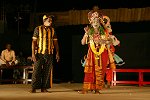The Tamil Nadu Kattaikkuttu Kalai Valarchi Munnetra Sangam is a grassroots organization that promotes the cultural and economic rights of professional Kattaikkuttu performers. It was established in 1990 by a group of seventeen performers belonging to different Kattaikkuttu theatre companies. At present the Sangam has more than two hundred members who live in the northern districts of Tamil Nadu and the Chittoor district of Andhra Pradesh. The Kattaikkuttu Sangam runs the Kattaikkuttu Youth Theatre School, which provides professional Kattaikkuttu training to underprivileged, rural children in combination with basic education. The Sangam provides a framework within which performers can discuss their professional demands and aspirations. It produces new plays, organizes theatre and other creative workshops, in addition to an annual Kattaikkuttu Festival.
The Kattaikkuttu Sangam is the organizer of the Kuttu Festival 2005 through which it wants to celebrate, together with other performers and its regular audiences, the fact that the organization exists fifteen years. For this special occasion a group of thirty-five performers who act in the nine different Kattaikkuttu performances put up by the Sangam, in addition to co-organizing the event. They special performance group represents actors and musicians drawn from two important Kattaikkuttu styles, that from around Kanchipuram-Cheyyar and that found in the Gingee-Vilupuram area.
4 hours Krishna's Embassy or Krishnan Tutu, here presented in a performance by the Kattaikkuttu Sangam's Festival Company, is attributed to the locally famous author, Kalavai La. Kumarasami (1847-1910?). The story recounts Krishna's visit to the Kauravas' court in the role of messenger or ambassador for the Pandavas. Krishna's war-inducing 'peace mission' consists of asking Duryodhana to return to the Pandavas half of the kingdom, which they lost in the fateful game of dice. In this play in particular, Krishna shows his true nature as a catalyst and a schemer manipulating all major characters so that they seemingly have no other option than to participate in the impending war. At the same time Krishna manages to extract from them special promises so as to create favourite conditions that will allow him to carry through his plans
To provide the Festival audience with the opportunity to get a taste of an all-night Kattaikkuttu, in which duration matters, the performance of Krishna's Embassy will stretch over two slots, i.e. four hours.
Before Krishna sets off on his embassy to Hastinapura he meets the Pandavas to ask them for their views on how to deal with Duryodhana. As can be expected, Bhima is in favour of provoking a war in order to avenge the Pandavas', and in particular Draupadi's, humiliation and fulfil their individual vows of killing a specific member of the Kaurava party. Dharmar, on the other hand, favours diplomacy. Krishna asks him what he should say if Duryodhana refuses to return the Pandavas rightful share of the kingdom. Dharmar instructs Krishna that he should then ask for five countries. If Duryodhana does not want to part with these, five towns will do. 'What if he does not want to part with these either?' Krishna asks Dharmar. 'Ask him for five houses for us to live in' Dharmar tells him. 'What should I say in the unlikely event that Duryodhana refuses to give even these?' Krishna asks him. Cajoling and confronting him with these different realities, Krishna then extracts permission from a dejected Dharmar that he may challenge Duryodhana to slap his hand as a promise that he will wage war.
Sahadeva, who appears to fathom Krishna's scheming better than his brothers, says that it does not really matter whether Duryodhana will return their share of the country or not. A war is inevitable because Krishna is determined to provoke it. Krishna takes him aside and asks him how he thinks a war can be prevented. In order to avert an impending war, Sahadeva says, both Duryodhana and Dharmar, who aspire power, should be send away to do penance in the forest. Karna should be made king. This will require the killing of Arjuna, because Arjuna will never allow Karna to reign. Bhima will have to be shackled and put into jail and Draupadi's hair will have to be shaven off so that she cannot fulfil her vow of tying it up again. Finally, Krishna should be bound. Krishna asks him who could possibly do this and Sahadeva answers him that he will bind him through 'a rope of/to the heart' (or through a 'rope of knowledge' - nanakayiru). Krishna challenges Sahadeva to show his power to do so and Sahadeva ties him up. Krishna, unable to free himself, begs Sahadeva to release him. Sahadeva, who apparently has grown suspicious that Krishna's destructive power may affect them, too, agrees to do so only after Krishna has sworn to protect all the five Pandavas and Draupadi in the impending war. Lastly, Krishna asks Draupadi for her opinion. She reminds him of the fact that she wants to fulfil her vow to rebraid her hair, which requires the killing of Duhsana, making it clear that she is in favour of war.
Krishna embarks on his 'peace mission'. In Hastinapura he stays at the house of Vidura. Initially, Duryodhana is glad to hear that Krishna, an honoured guest, has arrived. He prepares to receive him at his court with all regards, but then Sakuni and Karna spoil his mind making Krishna's motives and visit look dubious and dangerous. They tell him that his real mission is to ask for the Pandavas' share of the kingdom. Together with his advisors a furious Duryodhana begins to plot to murder Krishna. A deep, but invisible pit is dug under the thrown upon which he will be seated. A large army is stationed in the pit with the intention to kill Krishna once he has fallen into it. When Krishna enters the assembly hall he receives an icy welcome. All present avert their faces. Krishna grasps their scheme and reveals himself in his omnipresent form (visvarupam), destroying at once the pit and the soldiers hidden in it. Hereafter the negotiations begin in which Krishna asks for half of the kingdom, five countries, five towns and five houses, all of which Duryodhana refuses to give. Finally, he consents to give his hand in a promise to wage war. In the written versions of the Mahabharata, Krishna's Embassy ends with Krishna setting up a meeting between Kunti and Karna in which Kunti reveals that she is his real mother. She also obtains Karna's promise that he will use his deadly snake-weapon only once against Arjuna and that he will not kill any of her other four sons. In the Kattaikkuttu tradition, however, this incident is retold by Karna himself in the form of a flash-back in the play Karna Moksham (performed on March 5)..
Both the debate between Dharmar and Krishna, in which the latter asks the former instructions for the impending negotiations, and the actual negotiations between Duryodhana and Krishna are set in the form of tarkkams — powerful song-sequences between the principal characters involved in which the actors play with words, their meaning and the interpretation of the true nature of the characters they portray, reflecting on their position in the epic Mahabharata. It is these tarkkams which make the performance of Krishna's Embassy such an exciting and popular play for true Kattaikkuttu fans.
Tamil Nadu Kattaikkuttu Kalai Valarchi Munnetra Sangam & Kattaikkuttu Youth Theatre School |


